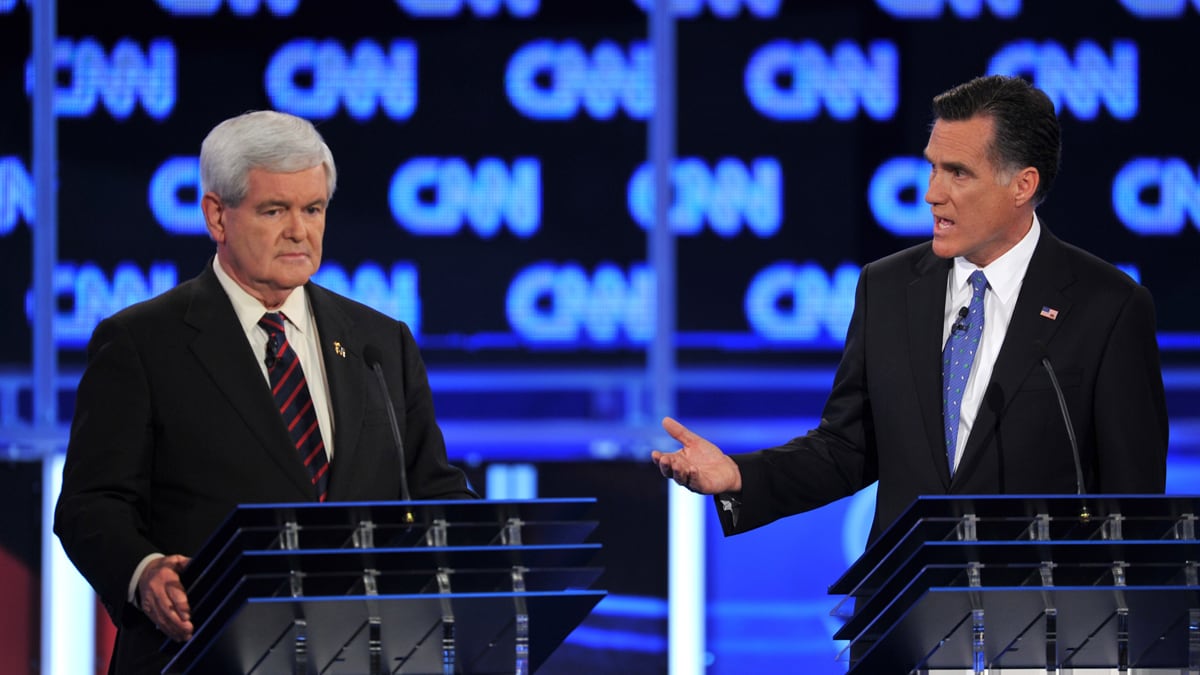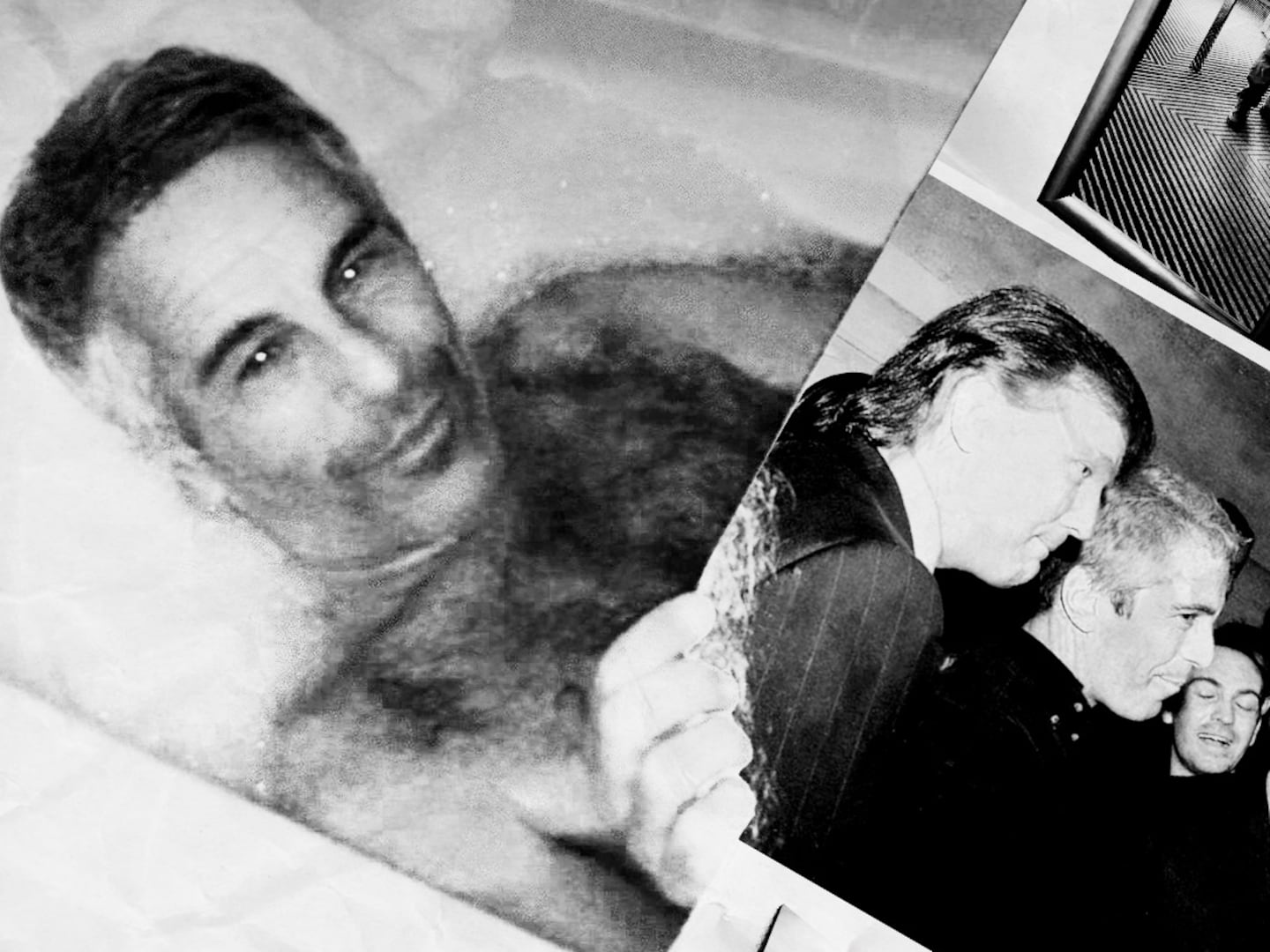The latest installment of the fascinating and deservedly popular reality series known as the GOP presidential debates posed important questions and even suggested some surprising answers.
Now that so many no-chance contenders have been voted off the island—did anyone seriously miss Jon Huntsman, Michele Bachmann, Rick Perry, Herman Cain, Tim Pawlenty, or Gary Johnson?—the nature of the entertainment has shifted from slapstick, three-ring farce to gut-gripping melodrama or even nail-biting thriller. The remaining contestants still can keep us guessing over the most basic plot points, including the unsettled issue of how much longer the excitement might meaningfully continue.
Some quick items to ponder:
1. Florida could be decisive. While conventional wisdom insists that the Romney-Gingrich grudge match will rage on unabated at least through Super Tuesday on March 5, there’s now a real chance that Tuesday’s Florida primary could provide a knockout blow. If Newt Gingrich loses badly in the Sunshine State, a widely predicted outcome in light of an off-balance, near-disastrous debate performance, it’s tough to see how he remains a credible threat to win the nomination.

After Florida, the tide of battle moves to territory that looks highly hospitable to Romney: Nevada caucuses on Feb. 4, Colorado and Minnesota caucuses on Feb. 7, and the Michigan primary Feb. 28. In all of these states, Romney won by decisive margins in 2008, and his campaign looks even stronger this time, making him the prohibitive favorite. In the Missouri primary (Feb. 7) Romney finished in a virtual first-place tie with Huckabee and McCain last time, but this year Gingrich isn’t competing in the state because the “beauty contest” vote doesn’t deliver any delegates. In Arizona (Feb. 28) Mitt finished a strong second four years ago to favorite son McCain, but this time the senator, who maintains a formidable organization on his home ground, ardently backs his former rival.
What all this means is that before Super Tuesday, Romney could well reel off a string of lopsided, largely uncontested wins, leaving little rationale for a Gingrich candidacy and no plausible path to the nomination. Casino billionaire Sheldon Adelson has so far kept the campaign’s finances on life support, with two infusions of $5 million each, but even this devoted Newtonian won’t keep doubling down forever on a bad bet. If Newt finishes 5 points or more behind Mitt in Florida, the former speaker will begin to look like a punctured balloon—an image that frequently suggested itself in the Jacksonville debate—as South Carolina becomes a distant memory that seems to be an outlier or an aberration.
2. The Wolf can bite back—with real teeth. One of the most surprising moments in the Thursday-night debate involved an utterly unexpected confrontation between Newt Gingrich and Wolf Blitzer, of all people. With the former speaker trying to drop the hockey mask and chain saw for a moment and attempting to project a benign, elder-statesman, let’s-put-aside-this-petty-bickering aura, Blitzer came back insistently to questions about Newt’s campaign-trail attacks on Mitt Romney’s financial holdings in the Cayman Islands and Switzerland.
Gingrich saw the slow, fat pitch coming down the plate and you could sense him savoring the moment, sure that he’d predictably hit it out of the park with one of his patented, popular attacks on the hated lamestream media. After noting his long-standing, friendly relationship with Blitzer, the former speaker angrily derided him for asking a “nonsense question.” But before the audience could explode with approbation, Wolf forcefully insisted that his query counted as appropriate because Newt himself raised such questions in the course of his campaign, and it seemed odd to try to dodge them when his oft-derided rival could provide answers. Romney clearly sided with Blitzer, eager to discuss the nasty attacks against him.
Newt seemed surprised, bemused, and defeated. He could easily survive losing a few rounds to Mitt—after all, he scored major knockouts of his own in previous debates—but blowing a confrontation with a lightweight media sparring partner like Blitzer made Gingrich appear like a scowling bully full of empty boasts and threats.
It didn’t help that this moment came the same day that the echo chamber of campaign discussion focused on another CNN win against Gingrich. John King earned a concession from the campaign that the candidate’s well-received putdown of the network reporter on the eve of the South Carolina primary had relied on mistaken information or outright lies. No, Newt hadn’t offered many close friends to ABC to rebut his ex-wife’s claims of his long-ago demands for an open marriage. The only witnesses the campaign suggested were, as Alabama observer Sally Vaci puts it, Newt’s two daughters from wife No. 1 to attack wife No. 2 for her fierce criticisms of wife No. 3.
3. Santorum can win debates, but that won’t necessarily translate into winning primaries. Without question, the former Pennsylvania senator enjoyed his best debate, presenting himself with passion, forcefulness, conviction, and appealing humanity and vulnerability. From the introduction of his beaming 93-year-old mother at the opening of the contest all the way to his moving recounting of his long, fruitful marriage with wife Karen at the end of the debate, Santorum looked smart and sympathetic. He was nearly brought to tears when talking about the loss of a newborn child (the Santorums have seven surviving children) and challenges with his other children, after Blitzer asked the candidates to talk about what their wives would bring to the role of first lady.
It’s easy to imagine Santorum making an emotional connection with many voters, and not just women, who hadn’t seriously considered his candidacy before the debate. The one-time senator also forced Romney into his only noteworthy fumble of the evening. With Santorum railing effectively and insistently against RomneyCare, Mitt tried to lower the level of intensity by suggesting “it’s not worth getting angry about.”
It’s easy to imagine future attack ads that misuse the phrase to try to prove Romney doesn’t believe “freedom is worth the fight” or suggesting that he wants to dismiss his own past mistakes, but the Santorum campaign doesn’t have the money to launch such barbs with any real effectiveness. Santorum’s lack of organization, funding, or game plan ensure he won’t be able to overtake Romney, especially since his fervent emphasis on abortion, marriage, and other social issues appeals primarily to a minority within the GOP. Like the rest of the country, Republicans care most about fixing the economic and fiscal mess in Washington and won’t relish reopening divisive debates like gays in the military when evidence suggests strongly that the tide of public opinion now runs against them.
Strong debate performances like his Jacksonville star turn won’t make Rick Santorum the nominee, but they could help him replace a collapsing Gingrich as the chief Romney alternative. Such an outcome would help Mitt in two ways: few observers envision Rick as the next president, unlike ardent admirers or Newt; and, inevitably, a long-term duel with Santorum and Rep. Ron Paul, with Gingrich either dropping out as a candidate or providing chiefly background noise, means more discussion of issues and fewer bitter personal attacks.
4. The two most underestimated words of the evening: “medical records.” When Wolfie posed the question, all four candidates cheerfully agreed to provide complete, comprehensive medical records, but it’s not at all clear that they will unanimously comply. Paul offered a charming answer about riding bicycles for 25 miles in the Texas heat, while Gingrich helpfully testified to Dr. Paul’s stamina on the campaign trail, but for a candidate who would reach age 77 before the election, the one-page summary the good doctor promised won’t nearly suffice.
Paul would be older upon assuming office than Ronald Reagan was when he left the White House after eight eventful years, making him by far the most elderly president in our history. The recent stroke afflicting Illinois Sen. Mark Kirk, a quarter-century Dr. Paul’s junior, indicates the vulnerability of any politician to major health crises. John McCain, a year younger than Paul, and five years younger when he ran in 2008, clearly lost some votes on the age issue, highlighting its potential power.
The need for medical records may not derail the Paulestinian crusade, as that cause has always involved advancing ideas more than placing a candidate in the Oval Office, but it could provide further damage to team Gingrich. The former speaker would be 69, Reagan’s age, when assuming office. Unlike Reagan, however, he hardly appears rugged and athletic: he has visibly gained weight on the campaign trail and would count as by far our most portly GOP nominee since William Howard Taft ran for reelection in 1912. In that year Big Bill, tipping the scales at 332 pounds, carried only Utah and Vermont, the worst performance of any Republican candidate since the party’s emergence in 1856.
Aside from real questions about his weight and general fitness, Gingrich must answer lingering doubts about his emotional health. His angry ex-wife Marianne suggested in an interview with Esquire magazine that he suffered a near nervous breakdown before he resigned as speaker, and his mother battled bipolar disorder and serious, crippling mental illness most of her life. So despite the breezy assurance displayed on stage, the provision of the complete, thorough medical records the media will demand may not be an uneventful matter for each of the remaining candidates.
With these and other compelling elements, the showdown in Jacksonville jolted the campaign and once again scrambled its already complicated narrative. Many worried GOP poo-bahs no doubt sighed in relief as a reinvigorated Mitt Romney took clear command and showed himself capable of dramatic growth and significant enhancement of his skill set in the midst of a tumultuous battle. More important, the energy emanating from the stage was undeniable. Despite fears that the ongoing fight amounts to a destruction derby that could leave the conservative cause in ruins, the evidence now argues that the battle itself is engaging a broader audience than ever before and looking, at last, significant and genuinely exciting. The GOP collisions may resemble a massive, occasionally bloody freeway pileup, but for growing numbers of gawkers it’s impossible not to watch.






